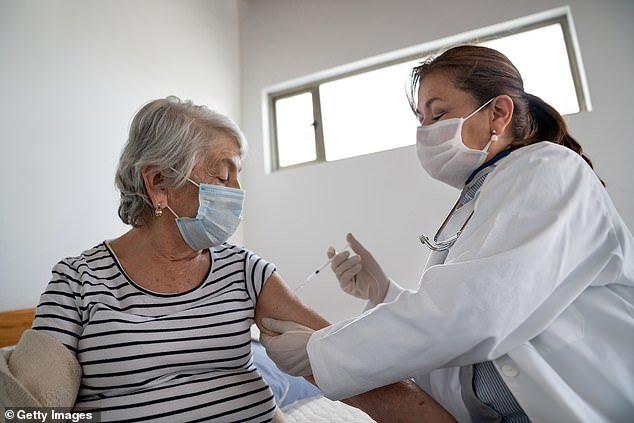A fifth of people admit they will feel resentful if they do not get a Covid jab before their summer holidays.
They fear it could scupper their plans, with controversial vaccine passports set to play a key role in deciding who will and won’t get to travel abroad later this summer.
A survey of nearly 5,000 UK adults found 18 per cent would feel resentful towards those who have been jabbed if they do not get one.
Middle-class earners are more likely to feel this way, with 24 per cent saying they would harbour ill feelings.
The Government’s target is to have offered a vaccine to all UK adults by the end of July, with the scheme opening to over-40s in England today.
There was widespread support for vaccinating the elderly and most vulnerable first when the rollout first launched in December.
But there is a growing sense that those who are able to prove they have been jabbed will be afforded more freedoms than unvaccinated people.
Transport Secretary Grant Shapps revealed earlier in the week that the NHS Covid app will be turned into a vaccine certification.
A fifth of people say they will feel resentful towards their peers if they do not get a Covid jab before their summer holidays (file)
Researchers from Bristol University, King’s College London and the National Institute for Health Research interviewed 4,896 adults aged 18 to 75.
One in eight respondents said they currently feel resentful towards others who have been vaccinated.
The research, carried out between April 1 and 16, also found that three in 10 adults believe vaccine passports would reduce civil liberties.
This is a rise from 25 per cent who felt this way in March.
And it identified ‘widespread concern’ about the ability to control forgeries, with 49 per cent thinking vaccination passports will be sold on the black market.
But ‘notable minorities’ said vaccine passports would make them feel more comfortable doing activities such as travelling internationally (42 per cent), sending their children to school (40 per cent) and going to a pub or restaurant (44 per cent).
Professor Bobby Duffy, director of the Policy Institute at King’s College London, said: ‘There is very widespread support for the staged approach to vaccination in the UK, getting to the oldest and most vulnerable first, as demonstrated by the fact that only 12 per cent of the currently unvaccinated say they resent those who have been.
‘This no doubt partly reflects the speed and efficiency of the vaccine rollout overall, as people can have confidence that they’ll get their turn soon.
‘However, there are some clear limits to this – with the summer holiday season a key target many have in mind, and a potential test of our collective spirit if some are free to travel while others are not.
‘Public faith in the equity and reliability of any vaccine passport system is going to need to be carefully encouraged, as large minorities are starting from a suspicion about its impact on civil liberties, and half think it could be used fraudulently.’
Dr Siobhan McAndrew, senior lecturer in quantitative social science at the University of Bristol, added: ‘Some members of the public see vaccination as a social duty, while others are more concerned with direct personal benefits.
‘Partly for that reason, there has been great policy interest in whether vaccination passports might encourage vaccine uptake.
‘These findings indicate they may do so, as well as allowing the leisure, hospitality and travel industries to reopen more promptly.
‘But we also have evidence of the challenges that may come with the passports – as significant proportions of the public fear they will be misused, including through curtailing civil liberties.’
It came after Mr Shapps revealed the NHS app will double as a Covid passport for tourists on Tuesday.
Sources said the app’s Covid passport update is still in development but is being rushed through before May 17, when foreign holidays become legal again.
Ministers hope an updated version of the app will allow people to display their vaccine and test status on their phones, with a personal scannable QR code for use at passport control.
Mr Shapps revealed the NHS app is being worked on to become a health certificate for international travel ahead of the G7 in Cornwall in early June.
But he refused to be drawn on the finer details of how it would work – leaving huge unanswered questions about how people would get record of a negative non-NHS test uploaded, and what happens to un-vaccinated people when they return from their holidays.
He told Sky News: ‘In terms of vaccine certification, I can confirm we are working on an NHS application, actually it will be the NHS app that is used for people when they book appointments with the NHS and so on, to be able to show you’ve had a vaccine or you’ve had testing.
‘I’m working internationally with partners across the world to make sure that system can be internationally recognised, as that’s the way forward. Actually, I’m chairing a meeting of the G7 secretaries of state for transport, my equivalents from America and Canada and all the G7 countries, next week on exactly this subject’.
